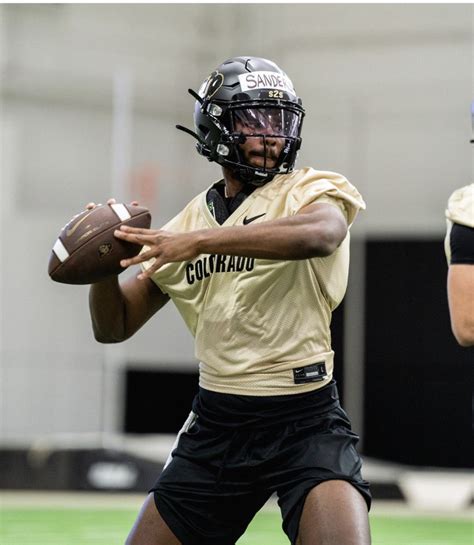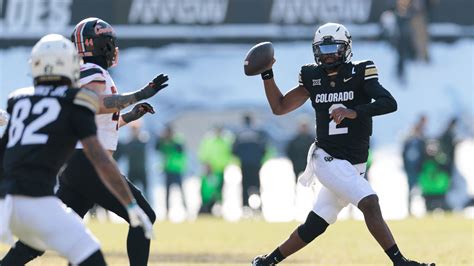
Shedeur Sanders, the star quarterback for the Colorado Buffaloes, has been cited for speeding for the second time in recent months, reigniting discussions about his driving habits and off-field conduct. The latest incident occurred in Boulder County, Colorado, prompting renewed scrutiny of Sanders, who has cultivated a high-profile image both on and off the field.
The Colorado State Patrol confirmed that Sanders was pulled over for speeding, though specific details regarding the speed and location of the infraction have not been publicly released. This incident follows a previous speeding violation in September, where Sanders was clocked driving 85 mph in a 55 mph zone in his white Lamborghini Urus. The initial violation resulted in a $168 fine and four points against his driver’s license.
While the details of the recent offense remain unclear, the repeated incidents have raised eyebrows among fans, analysts, and university officials. The confluence of Sanders’ on-field performance and off-field conduct is now under increasing examination.
Recap of Previous Incident
In September, Sanders was stopped by police and issued a citation for exceeding the speed limit significantly. According to the Colorado State Patrol, “Sanders was stopped for going 85mph in a 55mph zone” in his Lamborghini Urus. He subsequently paid the $168 fine. The Lamborghini was also the subject of social media attention, due to its value and high-profile association with Sanders.
Public Reaction and Scrutiny
The recurrence of speeding offenses has amplified public discourse surrounding Sanders’ behavior. Social media platforms have become a battleground for opinions, with some individuals criticizing Sanders for what they perceive as a disregard for traffic laws, while others defend him, citing his young age and the pressures of being a high-profile athlete.
Analysts have also weighed in, emphasizing the importance of athletes maintaining a positive public image, particularly given their role as role models for young fans. The scrutiny is not limited to social media; sports news outlets and commentators have dedicated significant airtime and column inches to dissecting the situation, exploring the potential impact on Sanders’ reputation and the Colorado Buffaloes program.
University Response
The University of Colorado has not released an official statement regarding the latest speeding incident. However, athletic department officials are undoubtedly aware of the situation and its potential implications. The university’s code of conduct for student-athletes emphasizes the importance of responsible behavior both on and off the field. Repeated violations could potentially lead to disciplinary action, although the specific consequences would depend on the severity and nature of the offenses.
Coach Deion Sanders, Shedeur’s father, has publicly addressed his son’s previous speeding ticket, expressing his disappointment and emphasizing the importance of responsible driving. “I addressed it, and we handled that, and he understands,” Sanders said at the time. “He’s got to make sure he’s above reproach and handles his business accordingly.” It remains to be seen how Coach Sanders will respond to this latest incident.
Potential Implications
The off-field conduct of high-profile athletes can have significant consequences, both personally and professionally. For Shedeur Sanders, the repeated speeding offenses could potentially tarnish his reputation, impacting his marketability and endorsement opportunities.
Moreover, the incidents could negatively affect the perception of the Colorado Buffaloes football program. Coach Deion Sanders has worked hard to rebuild the program’s image and attract top talent. Off-field distractions can undermine those efforts and create a negative narrative surrounding the team.
From a legal standpoint, repeated traffic violations can lead to more severe penalties, including license suspension or revocation. The accumulation of points on Sanders’ driving record could trigger further consequences under Colorado law.
Broader Context: Athlete Conduct and Public Image
The Shedeur Sanders speeding incidents underscore a broader issue surrounding athlete conduct and public image. High-profile athletes are often held to a higher standard of behavior, given their influence and visibility. Their actions, both on and off the field, are subject to intense scrutiny, and any missteps can have far-reaching consequences.
Universities and sports organizations have implemented various programs and initiatives to educate athletes about responsible conduct and the importance of maintaining a positive public image. These programs often cover topics such as social media usage, financial management, and interactions with the media. However, the effectiveness of these programs can vary, and ultimately, it is up to each individual athlete to make responsible choices.
Legal Ramifications of Speeding in Colorado
In Colorado, speeding is classified as a traffic infraction, but penalties can escalate based on the severity of the violation and the driver’s prior record. Exceeding the speed limit by a certain margin can lead to significant fines, points on the driver’s license, and potential increases in insurance premiums.
Under Colorado law, accumulating too many points on a driver’s license within a certain timeframe can result in suspension or revocation of driving privileges. The specific point thresholds vary depending on the driver’s age and the nature of the violations.
Moreover, reckless driving, which involves driving with a willful or wanton disregard for the safety of persons or property, is a more serious offense that can result in criminal charges, including fines and potential jail time. While the Shedeur Sanders speeding incidents have not been classified as reckless driving, repeated violations could potentially lead to such charges if the circumstances warrant.
The Lamborghini Urus: A Symbol of Success and Scrutiny
The fact that Shedeur Sanders was driving a Lamborghini Urus during the initial speeding incident added another layer of complexity to the situation. The Lamborghini Urus is a high-performance SUV with a hefty price tag, making it a symbol of success and affluence.
While there is nothing inherently wrong with an athlete owning a luxury vehicle, it can attract unwanted attention and scrutiny, particularly if the athlete is perceived as being reckless or irresponsible. In Sanders’ case, the Lamborghini Urus became a visual representation of his high-profile status and the expectations that come with it.
Sanders’ NIL Deals and Brand Image
Shedeur Sanders is one of the most marketable college athletes in the country, with numerous Name, Image, and Likeness (NIL) deals with prominent brands. These deals allow Sanders to profit from his personal brand and endorsement opportunities.
However, off-field conduct can have a direct impact on an athlete’s NIL value. Brands are often hesitant to associate themselves with individuals who have a history of questionable behavior. The Shedeur Sanders speeding incidents could potentially jeopardize some of his NIL deals if brands perceive him as a liability.
The Pressure of Fame and Expectations
Being a high-profile athlete comes with immense pressure and expectations. Athletes are constantly in the public eye, and their actions are scrutinized by fans, media, and sponsors. The pressure to perform at a high level on the field, while also maintaining a positive public image, can be overwhelming.
For young athletes like Shedeur Sanders, navigating the complexities of fame and fortune can be particularly challenging. They may lack the experience and maturity to handle the responsibilities that come with being a public figure. It is important for universities and sports organizations to provide athletes with the resources and support they need to make responsible choices and avoid pitfalls.
Deion Sanders’ Role as a Father and Coach
Deion Sanders’ role as both a father and a coach adds another dimension to the situation. As a father, he has a personal responsibility to guide and mentor his son. As a coach, he has a professional responsibility to ensure that his players adhere to team rules and conduct themselves appropriately.
Coach Sanders has publicly stated that he has addressed his son’s previous speeding ticket and emphasized the importance of responsible driving. It remains to be seen how he will handle this latest incident. However, it is clear that he faces a delicate balancing act between supporting his son and upholding the standards of the Colorado Buffaloes football program.
The Importance of Accountability
Ultimately, the Shedeur Sanders speeding incidents highlight the importance of accountability. Athletes, like all individuals, must be held responsible for their actions. There should be consequences for violating traffic laws or engaging in other forms of misconduct.
Accountability is not just about punishment; it is also about learning from mistakes and making amends. Athletes who take responsibility for their actions and demonstrate a commitment to सुधार can often regain public trust and maintain their reputation.
The Future of Shedeur Sanders’ Image
The future of Shedeur Sanders’ image will depend on how he responds to the current situation. If he takes responsibility for his actions, learns from his mistakes, and demonstrates a commitment to responsible behavior, he can potentially mitigate the damage to his reputation.
However, if he continues to engage in questionable behavior, he risks alienating fans, sponsors, and university officials. Ultimately, it is up to Shedeur Sanders to decide how he wants to be perceived by the public.
Conclusion
Shedeur Sanders’ second speeding offense has reignited scrutiny of his off-field conduct and raised questions about his responsibility as a high-profile athlete. While the details of the latest incident remain unclear, the repeated violations have the potential to tarnish his reputation and negatively impact the Colorado Buffaloes football program. The situation underscores the importance of athlete accountability and the challenges of navigating fame and fortune at a young age. The response from the University, Coach Deion Sanders, and, most importantly, Shedeur himself will be crucial in determining the long-term impact of these incidents. The balance between on-field performance and off-field behavior remains a critical factor in shaping the public perception and overall success of student-athletes.
FAQ: Shedeur Sanders Speeding Incidents
1. What exactly happened with Shedeur Sanders’ latest speeding incident?
Based on available information, Shedeur Sanders was pulled over for speeding in Boulder County, Colorado. Specific details regarding the speed and location of the incident have not been publicly released by the Colorado State Patrol. This marks his second speeding offense in recent months.
2. What was the penalty for Shedeur Sanders’ first speeding ticket?
In September, Shedeur Sanders was cited for driving 85 mph in a 55 mph zone. He received a $168 fine and four points were added to his driver’s license.
3. How might these speeding incidents affect Shedeur Sanders’ NIL deals and future endorsements?
These incidents could potentially impact Shedeur Sanders’ NIL deals and future endorsements. Brands often prioritize associating with athletes who maintain a positive public image. Repeated off-field issues can make brands hesitant to partner with an athlete, fearing reputational damage. Companies may re-evaluate their partnerships based on Sanders’ perceived responsibility and how he addresses the situation.
4. What has been the University of Colorado’s or Coach Deion Sanders’ response to these incidents?
The University of Colorado has not released an official statement regarding the latest incident. Coach Deion Sanders addressed the previous speeding ticket, stating he had discussed it with Shedeur and emphasized the importance of responsible driving. It remains to be seen how Coach Sanders will respond to the current situation, but he previously stressed the need for Shedeur to be “above reproach.”
5. What are the potential legal consequences of multiple speeding tickets in Colorado?
In Colorado, accumulating too many points on a driver’s license can lead to suspension or revocation of driving privileges. The specific point thresholds vary. Repeated traffic violations can also result in higher fines and increased insurance premiums. While these incidents were not classified as reckless driving, subsequent similar behavior could lead to these more severe charges.
Further Analysis
The situation surrounding Shedeur Sanders highlights a recurring theme in modern sports: the immense pressure and scrutiny placed upon young athletes. While Sanders has undeniably demonstrated exceptional talent on the football field, leading the Colorado Buffaloes’ offense, his off-field actions are subject to intense public examination, influencing his overall brand image and potential career trajectory.
The confluence of factors surrounding this situation – Sanders’ status as a high-profile athlete, his connection to a celebrated coach (his father), the symbolism associated with his luxury vehicle, and the burgeoning world of NIL deals – creates a complex narrative that extends far beyond a simple traffic violation. It touches upon issues of responsibility, accountability, and the pervasive influence of social media in shaping public perception.
The speed at which information travels in the digital age exacerbates the situation. Incidents that once might have remained relatively localized are now amplified globally within minutes, subjecting athletes to immediate and often unforgiving judgment. Social media platforms become echo chambers where opinions are reinforced, and nuanced perspectives are often lost in the din of instant reactions.
The role of universities in supporting their student-athletes in navigating these challenges is also crucial. While athletic departments often have resources and programs in place to promote responsible conduct, the effectiveness of these initiatives depends on several factors, including the athlete’s willingness to engage and the overall culture within the program.
Coaching staffs also play a critical role in shaping athlete behavior. In the case of Shedeur Sanders, the dynamic between father and coach adds another layer of complexity. Deion Sanders, known for his charismatic leadership and emphasis on personal branding, faces the delicate task of balancing his paternal responsibilities with his coaching duties, ensuring that his son is both supported and held accountable.
The long-term implications of these incidents for Shedeur Sanders’ career remain to be seen. While they undoubtedly create a negative narrative, they also present an opportunity for growth and redemption. If Sanders can demonstrate genuine remorse, take concrete steps to improve his behavior, and consistently conduct himself responsibly moving forward, he can potentially mitigate the damage to his reputation and emerge as a stronger and more mature individual.
However, the path to redemption requires more than just words; it demands consistent action and a demonstrable commitment to upholding the values of responsibility and integrity. The public’s perception will be shaped not only by Sanders’ apologies or statements but also by his subsequent behavior, both on and off the field.
The incidents also serve as a cautionary tale for other young athletes who are navigating the complexities of fame and fortune. The pressures of being in the public eye, combined with the allure of wealth and luxury, can create a perfect storm of potential pitfalls. It is essential for athletes to develop a strong support system, including mentors, advisors, and family members who can provide guidance and accountability.
Moreover, athletes must cultivate a strong sense of self-awareness and develop the emotional intelligence necessary to navigate the challenges of fame and fortune. This includes recognizing the potential consequences of their actions and understanding the importance of making responsible choices.
Ultimately, the Shedeur Sanders speeding incidents underscore the importance of accountability, responsibility, and the need for young athletes to be mindful of the impact of their actions on their personal brand and the broader community. The response to these incidents will not only shape Sanders’ future but also serve as a lesson for other athletes who are navigating the complexities of fame and fortune. The narrative surrounding this event will continue to evolve, with each action taken by Sanders, the University, and his supporters contributing to the ongoing dialogue about athlete responsibility in the modern era.









